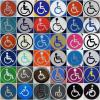I’m a greenhorn when it comes to political action. So when I received a request to promote National Disability Voter Registration Week, I turned to my colleagues at the Office of Social Justice (OSJ) who suggested contacting our local city government to ask them to make a proclamation about Disability Voter Registration Week. Great idea, but I know next to nothing about contacting local government. Thankfully, folks at our local center for independent living,Disability Advocates of Kent County (DAKC), knew who to contact. The next day (!) Adelyn at DAKC received a message from Assistant to the Mayor of Grand Rapids, Michigan, Amy Snow-Buckner, saying, “Mayor Bliss is pleased to provide a proclamation for Disability Voter Registration Week.”
Mayor Bliss is pleased, and I’m pleased that she “supports the growing involvement of the disability community in the political process” and proclaims July 11 – 15, 2016, National Disability Voter Registration Week.
For democracy to function well, citizens need to be able to vote. This is a justice issue. Citizens have the right to vote, including citizens with disabilities. The proclamation notes that “over 50 million people with disabilities of all ages [live] in communities throughout the United States.” It emphasizes that people with disabilities, like all people, have a critical interest in policy issues, and that voting is one way to influence the direction of these policies.
Here’s a thought to ponder: if the 50 million people with disabilities in the U.S. voted as a block, they would decide every single election for president. I can say this with certainty: they would decide every single election for president. The largest margin of victory by popular vote in the U.S. was in 1972 when Richard Nixon won the election against George McGovern by 18 million people. Barak Obama won by 9 and a half million people in 2008, and many presidents won by margins less than that.
How well is your community doing at making voting fully accessible for people with disabilities? For example, can they get to the polling place if they use a wheelchair? Can they use the ballot if they cannot see it? If you would like to get involved further, check out the National Disability Voter Registration Week resources and ideas, most of which are relevant far beyond this particular week. Here's a great accessibility checklist for polling places if you want to work with officials to ensure that the polling places in your community can be used by citizens with disabilities.
If you live with a disability, have you had trouble voting in the past? Please tell me about it!





The Reformed family is a diverse family with a diverse range of opinions. Not all perspectives expressed on the blog represent the official positions of the Christian Reformed Church. Learn more about this blog, Reformed doctrines, and our diversity policy on our About page.
In order to steward ministry shares well, commenting isn’t available on Do Justice itself because we engage with comments and dialogue in other spaces. To comment on this post, please visit the Christian Reformed Centre for Public Dialogue’s Facebook page (for Canada-specific articles) or the Office of Social Justice’s Facebook page. Alternatively, please email us. We want to hear from you!
Read more about our comment policy.